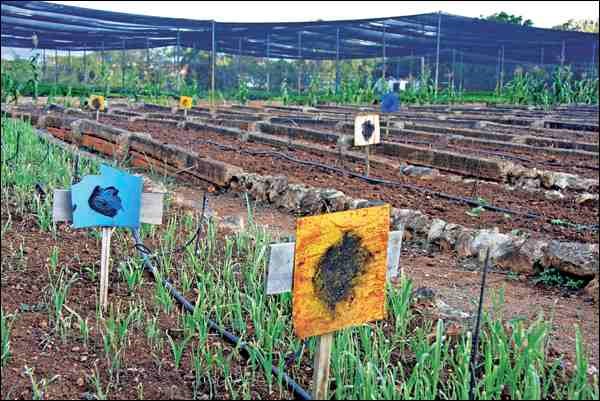Cuba is a world leader in sustainable organic farming and, as I am interested in all types of farming, I wanted to see for myself how farmers were managing to thrive in Cuba. The trip was organized by Wendy Holm who had connections with ANAP and co-operatives in Cuba.
For a little background and understanding of Cuban history and challenges, the following is from a website on Cuban sustainable organic farming. I couldn't say it any better or shorter.
"Cuba was once dependent on imports from the Soviet Union for a large percentage of staple goods as well as fertilizers, pesticides, animal feed and petroleum. The farms were large, high-input industrial farms, many of which grew cash crops in monocultures for export.
"When the Soviet Union collapsed in 1989, Cuba was plunged into a severe economic crisis, where imports of food and other basic necessities, including pesticides and chemical fertilizers, fell overnight. Within a year the country lost over 80% of its foreign trade, which compounded by ongoing US embargos, triggered widespread hunger and malnutrition in what was known as Cuba's "special period". Without infrastructure or fuel to transport goods from rural to urban areas, the cities had no way of feeding themselves. The crisis spurred the government into action: switched from the export of cash crops to growing food crops for domestic consumption; mobilizing resources and putting the urban wastelands into use as farms and orchards; offered incentives to encourage people to move back to rural areas to work on the land; and changed many state farms to co-operatives.
"Organic farming was specifically emphasized, and all over Cuba, production was converted from high-input agriculture to low-input, self-reliant farming using a mix of old techniques and new organic farming practices, for example: Composting and vermicomposting; Soil and water conservation; Intercropping; Encouraging natural predators of pests; Replacing synthetic with natural fertilizers; Increasing diversity of crops grown; Integrating grazing animals; Cover cropping to suppress weeds; Rotating crops.
"By 1995, the food shortage had been overcome . In 2002, Cuba produced 3.2 million tons of food in urban farms and gardens, providing fresh organic produce to the population and improving the diet of Cubans. Gardens attached to schools are more common as local food production, and ecological issues are a required part of the curriculum. Most rural homes produce their own staple foods, including beans and traditional root/tuber crops.
"Future challenges are predictably arising from market forces, which stand to undermine this system: urban farm space will compete for land for development of tourism (which brings in more foreign currency). Simultaneously, the development addresses unemployment, food security, environment, urban migration, community, recycling, and a cleaner environment and quality of life so absent from many developing world urban centers. It also shows how Cuba managed to turn a crisis into an asset."
Cuban agriculture "works with nature." In Cuba, one calorie of energy produces 12 calories of food. Canada uses 12 calories of energy to produce one calorie of food.
Cubans are proud of their history and accomplishments. The happiness factor of Cubans: is very high. Our guide says young people are 50/50 on the happiness factor.
As all people are from somewhere else - Spain, Africa, Holland, the United States - the people didn't have roots in Cuba, nor a strong sense of belonging. During the revolution, they got rid of colonialism, imperialism and exploitation. When Fidel Castro was arrested before the revolution, he said in his own defence, "history will absolve me." He is a hero to the country and highly respected for caring for the people.
This was a great trip for learning about organic agriculture. Besides the above, what I learned that affected me the most was that my 10- to 15-year-old eczema cleared up in two weeks. The last three days we were at five star hotels that use the same processed food that we have here. On the third day, just as we were leaving Cuba, my eczema broke out again.
Having read Seeds of Deception by Jeffrey M. Smith, I decided to take GM canola oil out of my diet. As I am a "from scratch" cook, it was not difficult to change to olive and coconut oils. Over the next four months, I discovered that when I was on the road, my eczema broke out again and again. Now, when at home, it clears up.
I am now convinced completely that genetically modified canola oil, corn products and soya products are the culprit for my eczema. Fifteen years of needless suffering for me as Monsanto and the like experiment on the population as a whole. To think that children 15 years and younger could be having problems because of this change in our food.
I would be interested in hearing from others who have gone off of GMs and found their health improved: [email protected]. Organic is the only way to go for better health.
Watch for Trip to Cuba: Part II, co-ops in Cuba; Part III, farm/urban life in Cuba and Part IV, crocodile farm preserve.



.png;w=120;h=80;mode=crop)
